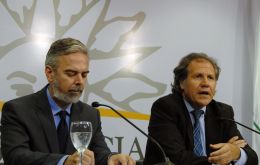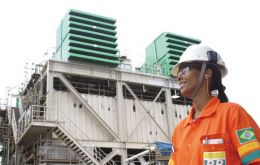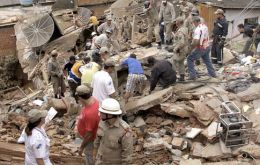MercoPress. South Atlantic News Agency
Brazil
-
Thursday, January 20th 2011 - 17:17 UTC
Brazilian and Uruguayan Foreign Ministers to Meet every Three Months

Brazilian and Uruguayan Foreign Ministers Antonio Patriota and Luis Almagro have agreed to hold bilateral meetings every three months they announced during a press conference in Uruguay. The ministers met to discuss the forthcoming meeting between Uruguayan President Jose Mujica and his Brazilian counterpart Dilma Rousseff, scheduled for the first week of February.
-
Thursday, January 20th 2011 - 16:44 UTC
Brazil Raises Interest Rate to 11.25%

Brazil’s Central Bank has increased its key interest rate to 11.25% in the hope of halting inflation. The rate has gone up from 10.75% and is the first under the Government of President Vilma Rousseff, who came in to office earlier this month.
-
Wednesday, January 19th 2011 - 22:56 UTC
Brazil Created a Record 2.52 Million New Jobs in 2010

Figures in Brazil show that 2.52 million new jobs were created last year, the Brazilian Labour Ministry reported.
-
Tuesday, January 18th 2011 - 19:20 UTC
Brazilian President Dilma Rousseff Will Reanalyze Offers to Buy Jets

The Brazilian president has decided to postpone the purchase of fighter jets.
-
Tuesday, January 18th 2011 - 17:41 UTC
UNASUR Statement on the Flooding and Mudslides in Brazil

The Member States of the Union of South American Nations (UNASUR) wish to express their heartfelt sympathy to the Government and people of Brazil, particularly the relatives and friends of those who lost their lives, their homes and to those injured in the recent flooding and mudslides which occurred in southeastern, Brazil on January 12, 2011.
-
Monday, January 17th 2011 - 20:59 UTC
Brazilean Central Bank Intervenes in Futures Dollar Market to Stop Real Appreciation

Dilma Rousseff has taken measures to stop the appreciation of the real. The Brazilian Central Bank swapped all of the currency futures contracts in a reverse swap auction. This way the institution headed by Alexandre Tombini disembarks in the futures market.
-
Monday, January 17th 2011 - 06:14 UTC
Army deployed in Rio de Janeiro state to assit with the rescue efforts

Rains that devastated a mountainous region north of Rio de Janeiro have killed at least 626 people, Brazil's Civil Defense agency said on Sunday, as fears of more storms and disease outbreaks overshadowed rescue operations.
-
Friday, January 14th 2011 - 02:22 UTC
Brazil flood deaths rise to 500

Rescue workers struggled to reach areas cut off by devastating floods and landslides that have killed at least 500 people in one of Brazil's worst natural disasters in decades.
-
Wednesday, January 12th 2011 - 17:58 UTC
Brazilian Offshore Subsea Lab

The Brazilian government and Navy are considering an ambitious plan for launching an offshore subsea lab to be located at the limit of the country´s territorial waters and beyond the farthest pre-salt play
-
Tuesday, January 11th 2011 - 22:08 UTC
Inflation forces Argentina to urgent import of note bills from Brazil

A shortage of bills that has led to lines and protests outside Argentine banks since mid-December may be resolved by next week after the country boosted imports of notes printed in Brazil.
